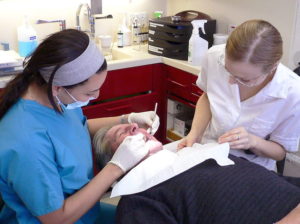
One in 10 American adults has avoided a needed dental visit due to fear, according to federal data.
Some patients panic at the thought of lying prone in the dental chair. Others dread opening the intimate territory of the mouth for inspection and judgment. The one-way conversations, the sharp instruments, the smells and sounds of the dental office can all stir so much anxiety that people delay timely care.
As a result, their oral health suffers.
A recent workshop convened by the National Institute of Dental and Craniofacial Health, brought together researchers from the fields of dentistry, psychology and psychiatry to discuss the problem of dental fear and strategies for tackling it, Anna Maria Gillis reported in the winter issue of NIDCR News.
At the workshop, researchers highlighted a variety of approaches: psychologists have used cognitive-behavioral and virtual-reality exposure therapies to help patients face and work through their anxieties. Pharmacological interventions also have a place in the management of dental anxiety, the experts said. But over the long-term, behavioral strategies have the advantage of equipping patients with coping skills that they can use in a variety of settings, the researchers said.
“Workshop participants emphasized the need for the right intervention for the right person at the right time,” Gillis wrote.
But that goal is hampered by the lack of a commonly agreed-upon standard for assessing fear, she noted.
“A potential solution is to include assessments that specify fears on patient intake forms. Studies are being conducted to learn whether smartphones and iPads could be used to deliver pre-treatment interventions at home or in the dentist’s office, and early results are promising,” she wrote.
Challenges remain. There is the question of how best to integrate anxiety treatments into dental practices, Willis noted. There is the quandary of how to help the patients who are too afraid even to show up.
Check out this new AHCJ tip sheet to help guide your reporting on this issue.




